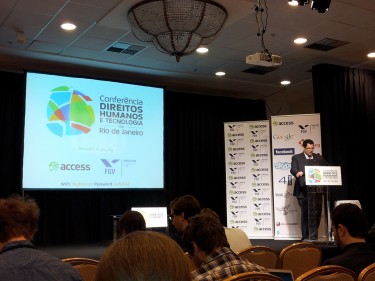Activists, business representatives, thinkers and policy makers are meeting in Rio de Janeiro, Brazil for the Human Rights and Technology Conference, hosted by Access in partnership with the Center for Technology and Society from Getulio Vargas Foundation in Brazil.
Speakers and participants discussed everything from social movements and digital natives, to Net Neutrality and the digital divide.
Andrew Mclaughlin from Tumblr described the most relevant threats to a free Internet:
Here are the key battles: Censorship and political control, which is the erection of a technical architecture of control that can be used for ill. Surveillance and piracy is battleground number two, where we see within the rule of law, outside the rule of law, and by companies themselves. And finally, the structure of the internet is under attack, the battles around network neutrality, wireless network neutrality, competition or the lack thereof, and the legislation that would control it, like SOPA/PIPA, ACTA and CISPA.

Jochai Ben Abi from Access at Rightscon Picture by Paulo Rena under a Creative Commons License
Brett Solomon, director of Access, highlighted the importance of Latin America in shaping the future:
We acknowledge the leadership in Latin America on the many things that are taking place. The marco civil in Brazil, the Costa Rican recognition of access to the internet as a fundamental human right.
Via video conference, Marietje Schaake, MEP for the Netherlands, told attendees we are entering a new era of diplomacy:
A new era of global Internet politics kicked off with the introduction of the idea of the ITU managing the Internet. I don’t believe that a UN body could regulate this effectively, and I don’t believe that government alone, without a multi-stakeholder approach, could govern the Internet. And we must be careful that emerging economies don’t push human rights off the agenda, when economic growth is on the table. Western companies must stop providing technology for censorship and surveillance. IT is a fundamental misunderstanding of the rule of law.
A roundtable also discussed how digital natives are changing the World, using the #yosoy132 movement in Mexico as an example.
While discussing privacy and security, computer expert and activist Jacob Appelbaum advocated for strong protection of privacy and cautious use of social networks. He said:
Facebook in some ways is Stasibook–you report on your friends all the time.
He later explained the importance of security technologies being available for all, even for the “bad guys”:
As a planet, I think we need to make a decision to all be secure, even some bad guys, rather than to all be insecure, and policed by governments which are not good at self-regulating, and are not transparent or accountable about what they do with this information.
A small delegation of Global Voices authors is attending the conference, including Ellery Biddle and Jillian York from the U.S.A., Claudio Ruiz from Chile, Diego Casaes from Brazil, and Elaine Diaz from Cuba.
During the conference The Guardian Project, an initiative which aims to create technologies and hardware to protect communications and personal data from intrusion and monitoring, organized the Free Bird Event, a one-day workshop that aims to empower mobile technology users with greater knowledge about security and privacy.
At the conference, the Access Innovation Prize was announced, which will distribute USD100,000.00 around the World. The deadline to apply for the prize is August 15, 2012 and anyone in the World can apply for any of its five categories. The award's website explains:
The Access Innovation Prize is designed to discover and reward ideas that demonstrate unique promise, opportunity and possibility. You can submit a near to complete project, improve an existing tool or create something totally new.
The conference ends today, June 1, with a discussion on the future of digital rights in Latin America and beyond, but the conversation around theses issues is just starting.
Liveblogging has been facilitated by @krmaher; Live-streaming has also also available, and the Twitter account @rightscon –tweeting in three different languages– is more active than ever. Anyone around the World can send a question to specific panels, so start the conversation and share your comments on how businesses can improve and side with citizens while defending digital freedom.






